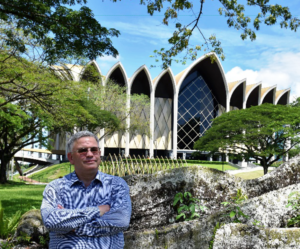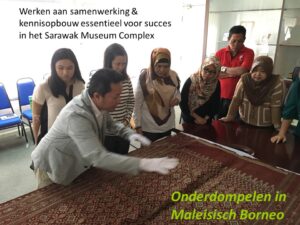3 Juni : Feestelijke opening van de AKAR ARTS in Cloud Gallery Amsterdam
In de tentoonstelling ‘AKAR ARTS’ presenteert de Vereniging Nederland-Maleisië (VNM), i.s.m. Cloud Gallery, hedendaagse kunstwerken van zes Maleisische upcoming kunstenaars. Wat alle kunstenaars verbindt is de band die zij koesteren met Maleisië waar hun ‘roots’ (akar) liggen. Deze verbondenheid komt sterk in hun werken naar voren. Soms heel persoonlijk of universeel, en soms aandacht vragend voor een maatschappelijk thema zoals de natuur.
AKAR ARTS exposeert een selectie van werken van Sampat Studio (kunstenaars duo Marcos Kueh en Isabelle Nair-Lachetta), Elias Mohd, Atjap Salam, Jan Schilthuizen en Riff Ariffin.
Hare Excellentie Dato Nadzira Osman, Ambassadeur van Maleisië in Nederland was onze eregast tijdens de opening op 13 Juni 2023. Haar aanwezigheid symboliseerde de sterke band tussen de twee naties. Ambassadeur H.E. Dato Nadzira Osman opende de tentoonstelling door haar oprechte waardering voor de kunsten uit te spreken en haar dankbaarheid over te brengen aan de Vereniging van Nederland-Maleisië voor het organiseren van dit evenement, dat een platform is voor de opkomende Maleisische artiesten om hun talenten te laten zien.
Het was een gezellige avond met vele leden van de VNM en een grote opkomst van genodigde en geïnteresseerde. De tentoonstelling is te bezoeken tot 17 Juli 2023 en de Cloud Gallery is elke dag geopend tot 17 uur.
Over de werken en de kunstenaars:
Wayang Kulit (2022) is gemaakt door het Maleisische duo Marcos Kueh (1995, Kuching) en Isabelle Nair-Lacheta (1998, Kuala Lumpur) onder hun gezamenlijke ontwerpstudio, Sampat Studio. Geïnspireerd door de actuele discussie in Nederland voegt het duo hun perceptie en eigen waarden toe aan het discours van etnische inclusiviteit en diversiteit Het werk verbeeld interessante lokale verhalen uit hun Zuidoost-Aziatische erfgoed die zowel geest als ziel stimuleren. Bezield door de gedeelde overtuiging in Azië dat elk object ook zijn eigen spirituele eigenschappen heeft, nodigt Wayang Kulit het publiek uit om anders te kijken naar de dagelijkse objecten om ons heen en hoe we ruimtes meer samen delen met dingen en dieren. Het nauwgezette textielvakmanschap van Kueh en de driedimensionale wereldopbouw van Lacheta zorgt voor een patroon van verfijnde lagen waarin de Zuidoost-Aziatische symboliek doorklinkt over de aanwezigheid van de geest van een vrouwelijke krijger in de stijl van een Wayang Kulit (traditionele schaduwpop) die het kleurrijke tapijt bewoont.
Jan Schilthuizen (1993, Leiden) is fotograaf en beeldend kunstenaar wiens werken de complexe thema’s identiteit, nostalgie en perceptie van onze herinneringen onderzoeken. Geboren in Nederland maar een groot deel van zijn jeugd doorgebracht in Maleisië op het eiland Borneo, heeft de artistieke ontwikkeling van Schilthuizen sterk beïnvloed vanuit zijn multiculturele afkomst, zijn liefde voor de natuur en het verlangen naar een plek die hij ’thuis’ noemt. Puttend vanuit zijn ervaringen van zijn Chinees-Maleisische achtergrond, stelt Schilthuizen beelden samen die een gevoel van verlangen en introspectie oproepen. Zijn fotografische composities, vaak doordrenkt met een vleugje surrealisme, nodigen de kijker uit tot een reis door de landschappen van de eigen herinnering.
Naast zijn foto’s die allemaal zijn gemaakt op het eiland Mantanani voor de kust van Maleisisch Borneo, zamelt zijn zonnebrillenmerk ook geld in voor een plastic-opruimproject op het eiland.
Als er één woord is dat de Amsterdamse kunstenaar Elias Mohd (1958, Terengganu) zou samenvatten, dan is het ‘productief’. In een internationale carrière van meer dan drie decennia heeft Mohd een duizelingwekkend oeuvre geproduceerd, variërend van keramiek en schilderijen en beeldhouwwerken tot grafisch ontwerp, couture en textielontwerp. Elias groeide op in een familie van artiesten en dansers, die de basis legden voor de ontplooiing van zijn vele talenten toen hij in 1987 naar Europa verhuisde. Hij begon zijn carrière als grafisch ontwerper in 1981 en stapte later over naar driedimensionale kunst toen hij werd aangesteld als huisontwerper bij Hotel Equatorial Kuala Lumpur. Of het nu gaat om zijn schilderijen, keramiek of 3D-stukken, zijn kunst weerspiegelt zijn diepe respect voor zijn Aziatische roots, terwijl hij vrijelijk westerse invloeden verkent waarvan hij voelt dat deze zijn artistieke expressie verrijken.
Atjap Salam (1988, Shah Alam) ook wel Salammusik / Ashraaf bin Ahmad Azlan groeide op in Maleisië. Na een studie muziek en sounddesign aan de Lim Kok Wing Universiteit volgde hij beeldende kunst opleiding aan de Rietveld Academie te Amsterdam. Een van zijn nieuwste releases, ‘Riwayat’, is een hardcover kunstboek dat de geschiedenis van Maleisië verkent en visualiseert in een mix van muziek, schilderkunst, poëzie, en het boek zelf.
Het totaalwerk is te ervaren in de tentoonstelling en biedt bezoekers een multi-zintuiglijke ervaring. Atjap’s liefde voor de cultuurgeschiedenis en kunst van Maleisië is zichtbaar in zijn werken. Zijn werk in de expositie verbeeld de gemoedstoestand van de Maleisische bevolking als reactie op buitenlandse indringers tijdens de koloniale periode. Atjap heeft meerdere prijzen en nominaties ontvangen voor zijn muziek en kunstontwerpen.
Riff Ariffin (1984, Kota Bharu) is een Maleisische eco-bewuste designer. Zijn passie is om zo duurzaam mogelijk te ontwerpen, waarvoor hij productiebedrijf Sattica oprichtte. Hoewel eco-bewust design relatief nieuw is in Maleisië, winnen zijn ontwerpen aan populariteit. Tijdens zijn studie architectuur en design heeft hij naast aandacht voor kwaliteit ook zijn creativiteit in design verder kunnen ontwikkelen.
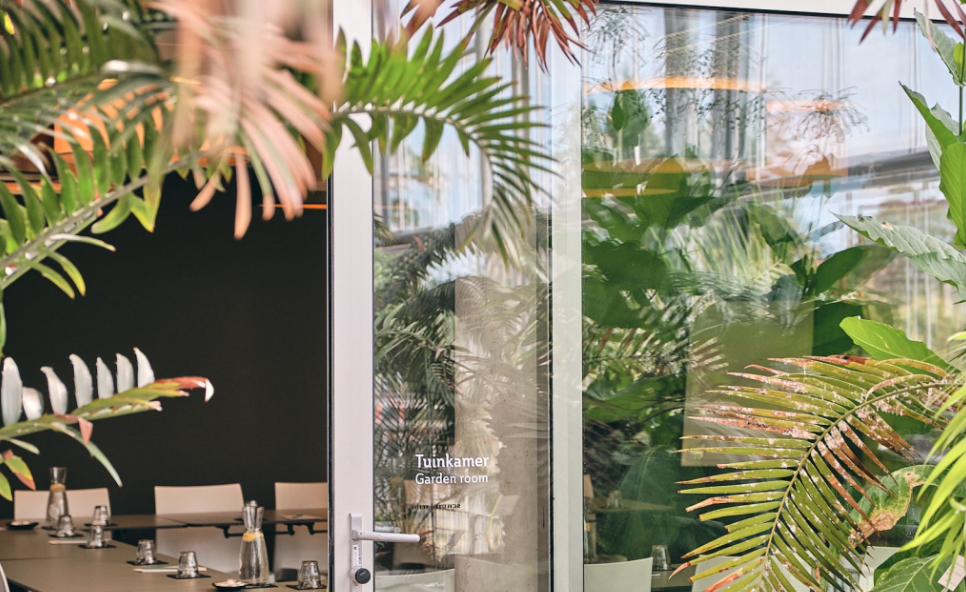
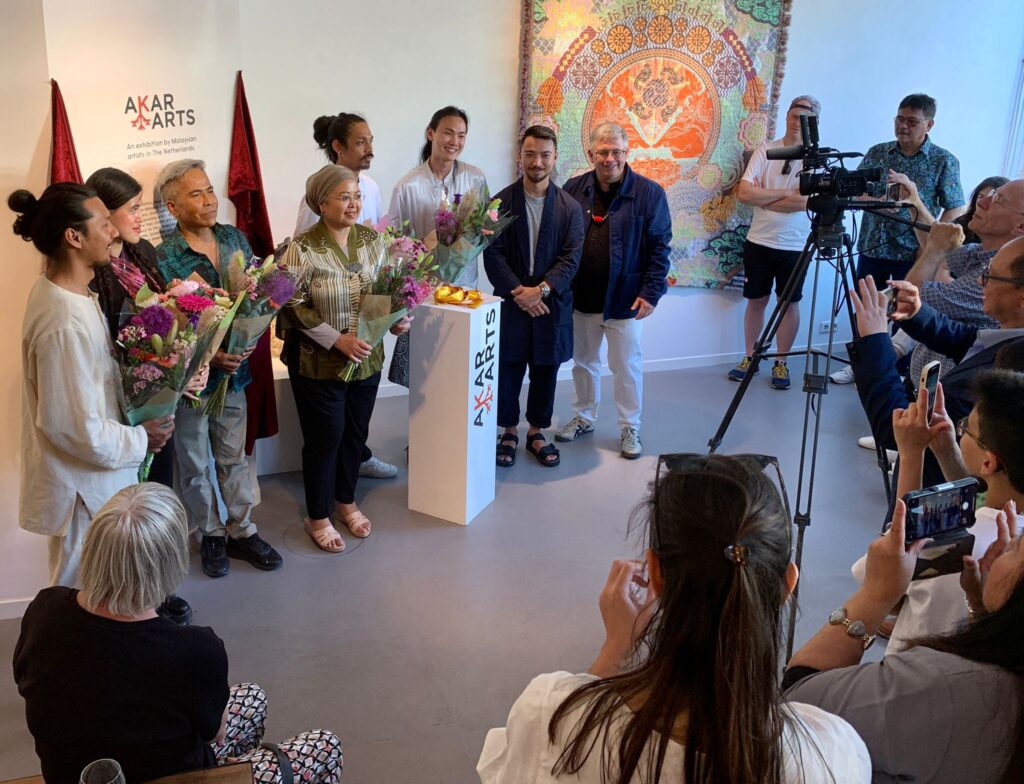
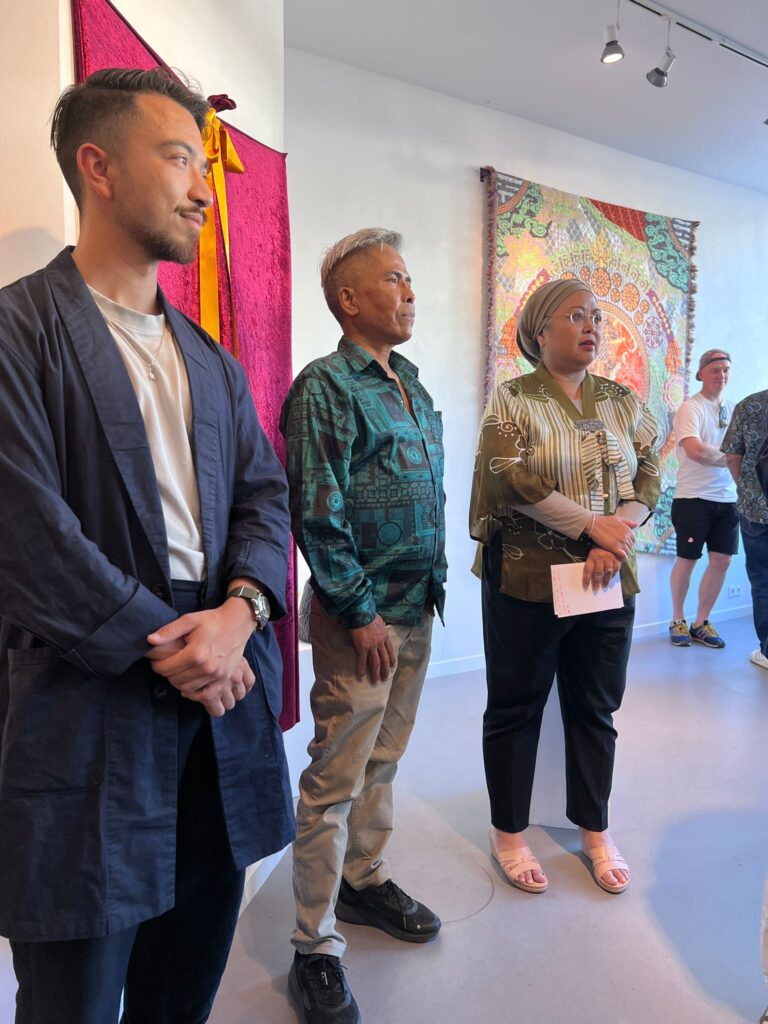
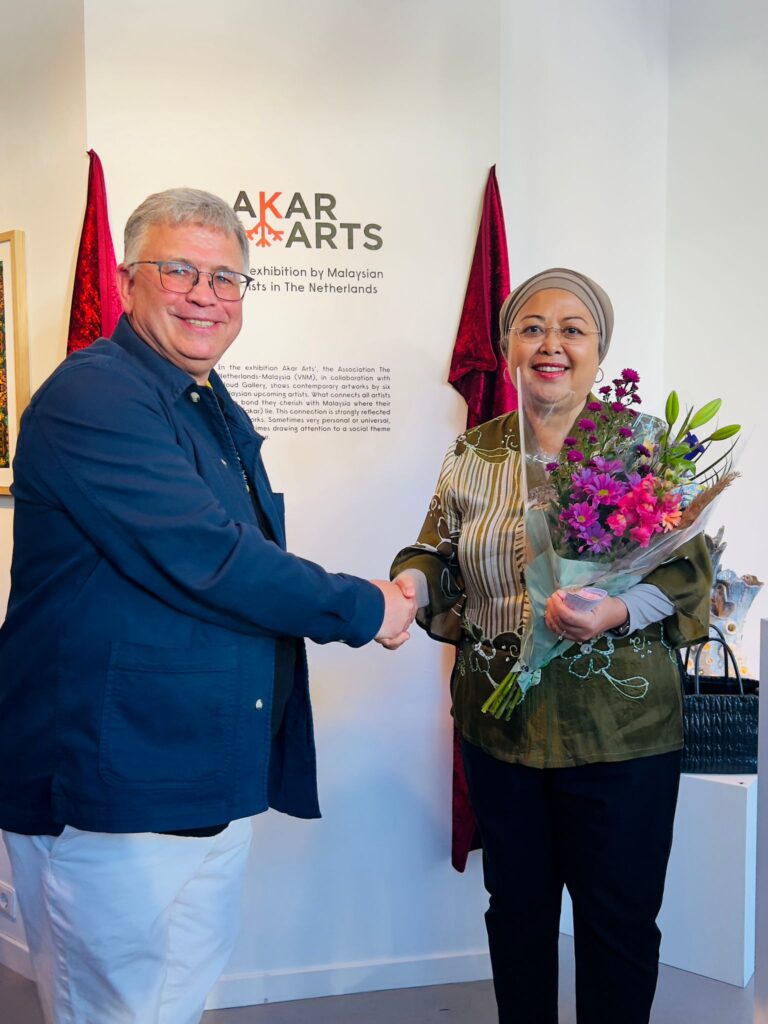













 .
. 


